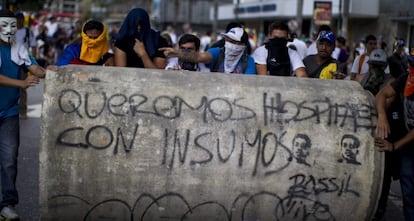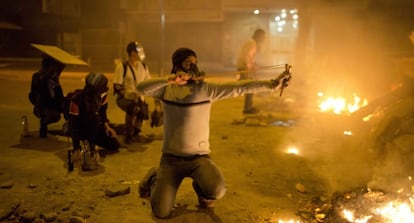Students step up protests in Venezuela despite Carnival holiday
Maduro decrees an entire week’s vacation in order to diffuse social tensions

Tens of thousands of demonstrators in Venezuela hit the streets again on Sunday to maintain their pressure on President Nicolás Maduro’s government, despite his decree to grant citizens an entire week’s holiday from their jobs to coincide with the long Carnival weekend.
University students, who kicked off the demonstrations early last month, have rallied ordinary citizens nationwide to demand better security in the streets, the end of government repression and no more shortages of basic foodstuffs. At least 18 people have died and more than 260 have been injured in clashes between police and demonstrators.
Students organized massive marches in Caracas, starting from four different locations across the capital, with the demonstrators converging in Plaza Brión, in the city’s Chacaíto district, which has become a symbolic square for the opposition. Marches were also held in the cities of Barquisimeto, Valencia and Puerto Ordaz.
Sunday’s marches demonstrated how people have decided to sacrifice their Carnival holiday – an important vacation period for many Venezuelans – to express their continued outrage at the Maduro government.
In an effort to try to calm social tensions and deflate some of the pressure, Maduro decreed three extra holidays for Carnival – seven in total – including Ash Wednesday, which also falls on the first anniversary of the death of his predecessor, Hugo Chávez. The fiery Chávez, who remained in power for nearly 15 years, died of cancer on March 5, 2013.
“We are not tired nor will we grow tired. We have a commitment with this nation, and it is this nation that is encouraging us to go out on the streets,” said Juan Requesens, president of the Federation of University Campuses at Venezuela’s Central University (UCV) in Caracas.

During his speech at the end of the rally, Requesens said that he and other student leaders were willing to accept Maduro’s invitation to dialogue only if the meeting is broadcast live on the radio and television and a pre-agreed agenda is adopted. The students are also demanding to know who will be the mediators on behalf of the government.
“But if he thinks that we are going to Miraflores [presidential palace] to demobilize the people, then we won’t be setting foot inside Miraflores,” the student leader said.
In a simultaneous event, Maduro spoke at a rally of his own supporters in Paseo de Los Próceres [a large, wide closed-off boulevard built in honor of Venezuela’s 19th-century heroes and used for military parades]. “The people of Venezuela are victorious because happiness and peace reign,” he said. “Venezuela is at peace, enjoying the rivers, mountains and beaches,” the president added, in reference to the Carnival holiday.
Social network users and tourist agencies have acknowledged that there has been a discreet influx of visitors who have been observing the traditional holiday. Yet many citizens decided to stay home for many reasons, including fears for their safety and because of abundant shortages of basic consumer items.
At the same time, popular tourist destinations, such as Margarita Island and Colonia Tovar – a Bavarian-style mountain town outside Caracas settled by German immigrants in the 19th century – were also besieged by protests. Police used tear gas to disperse demonstrators, who had set up roadblocks, outside Colonia Tovar.
Riot police also clashed with protestors in the affluent Caracas neighborhoods of Las Mercedes, Santa Fe and Altamira on Sunday. The ongoing demonstrations have attracted more middle-class residents over the past few weeks.
The Maduro government’s strategy over the past few days has been aimed at controlling the news coverage of the security and shortage crises rather than actually solving problems. On Friday, 41 people were arrested, including several journalists, at Caracas’ Plaza Francia in Altamira, a neighborhood stronghold of the opposition.
Pro-government media reported that “eight international terrorists” were captured. Later, it emerged that one of the arrested persons was Francesca Comissari, an Italian news photographer.







































